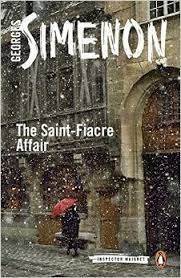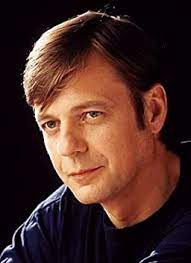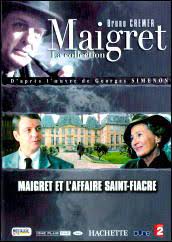IMDb meta-data: runtime of 1 hour and 24 minutes, rated 7.1 by 91 cinematizens.
Genre: Krimi, Maigret
Verdict: Superb.

Maigretistas will instantly recognise Saint-Fiarce as the tiny village where Maigret was born and raised. In the film he is accompanied by his wife, Louise, who has a thing or two to say to him as the plot unfolds. Nicely done. For once Madame Maigret does more than make the coffee. In the book, which I re-read after watching this film version, he is alone. In both there is a letter in which a murder is announced: à la of Agatha Christie.
In the book, the letter is sent to the local plod who passed it up the line and by chance Maigret saw a photograph copy of it on a desk in the Quai des Orfevres, and decides to go and see for himself. In the film, the letter is sent directly to Maigret lui-même as a personal challenge. In neither case is there an adequate explanation of why the letter is sent at all, though perhaps it was part of the plan to implicate the Count, as below.
The murder is ingenious, and kills the widowed Countess de Saint-Fiacre. Her wastrel son, the Count, is the obvious villain who wishes to hasten his inheritance. He is played in the film by Jacques Speisser who is marvellous as the troubled, tortured, intelligent, sensitive, confused, angry, and brutish Count de Saint-Fiarce. The pain in eyes at times is evident, even when his words belie it.
In the book, the final denouement at dinner is entirely the handiwork of the Count, casting Maigret as a spectator. In this film version the suggestion is that Maigret and Count have conspired to set it. The doctor is also effectively enlarged in the film. Indeed, in the film the Countess is also given a personality lacking in the book. The plot against her and the count is much more elaborate in the book than in this film, too.
In both film and book it is also apparent that, though the sanctimonious priest will not violate the confessional, he will take matters into his own hands, infuriating Maigret.
The story has been filmed at least three times before.
The high points of this version include Madame Maigret telling Jules to pull his socks up and stop mooning about like a schoolboy, and the Count’s anguish.

By the way, Spiesser is still at work as Magellan in an eponymous television series that has been running since 2009. He has also played second-fiddle Danglard in the Adamsberg krimis.

